

Cyberbullying Vegans Send Canadian Farmers Into Depression. Vegan activist cyberbullies have become a growing concern for Canadian farmers, who face aggressive accusations, criticisms and even physical threats online every day.
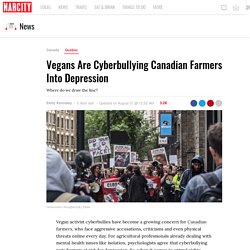
For agricultural professionals already dealing with mental health issues like isolation, psychologists agree that cyberbullying puts farmers at risk for depression. So, when it comes to animal rights advocacy, where do we draw the line? 26-year-old Mylene Begin, a co-owner of Princy Farm in Quebec, told the Canadian Press that after starting an Instagram account for her farm, she received over 100 negative comments from vegan activists daily.
“There was one that took screenshots of my photos, he shared them on his feed after adding knives to my face and writing the word 'psychopath' on my forehead," Begin said. Angry? Depressed? You Could Be Grieving Over World Events. The Cultural Politics of Softness. Artist Lora Mathis was the first to spell it out for me: radical softness can be used as a weapon.
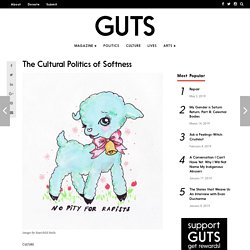
Their well-known piece, “Radical Softness as a Weapon” showed these words surrounded by pearls, diamond earrings, and knives. Though the piece began making the rounds on the internet a few years ago, the interest in softness has continued to circulate, and show up in sometimes unexpected places. The Gift of Presence, The Perils of Advice. When my mother went into a nursing home not long before she died, my wife and I were told that, for a modest increase in the monthly fee, the staff would provide a few extra services to improve her quality of life.
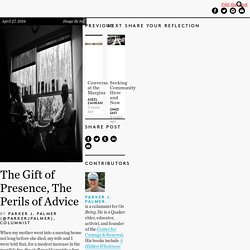
We gladly paid, grateful that we could afford it. Now in our mid-seventies, my wife and I have no imminent need for assisted living or nursing care. But the house we live in is, by definition, a two-person residential facility for the aging. Slate’s Use of Your Data. Why White People Must Talk About Their Whiteness. When I first started thinking about writing this article, I intended to share my experience of having my privilege called out publicly on Facebook — the defensiveness and discomfort that caused and the huge amount of unpacking I’ve had to do (and will continue to do) — with the hope that others would challenge their own privilege.
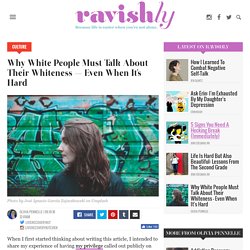
After beginning the work, however, I discovered the inherent racism so deeply ingrained in our culture, and I began to feel inadequate about addressing this topic publicly. I found myself shying away from the idea of standing up on a platform as another white woman centering herself and taking up space that could be used by people of color. Easily-Triggered Privileged People Have Turned Society Into Their Own Giant Safe Space. Why Anthony Bourdain’s Life Is a Lesson for White Men of Privilege on How to Be an Ally.
9 Ways We Can Make Social Justice Movements Less Elitist and More Accessible. By Kai Cheng Thom / everydayfeminism.com/ Sep 29, 2015 In my first year of college, I stopped calling myself an activist.

It took attending just a few meetings of the campus queer group for me to realize that I didn’t fit in with everyone else. Despite that the fact that I was definitely queer – a pre-transition trans woman at the time – I could tell immediately that I wasn’t “queer enough” to fight for social justice alongside these university-educated revolutionaries who spoke with such confidence and rolled their eyes every time I opened my mouth. I didn’t know what “trigger warnings” or “intersectional systemic oppression” were.
Intersectional feminism means showing up when there are no pink hats. 30 Things People Don’t Realize You’re Doing Because You Actually Have Self-Respect Now. Colleges need a language shift, but not the one you think (essay) Several months later, I hesitate to offer yet another election postmortem for higher education.
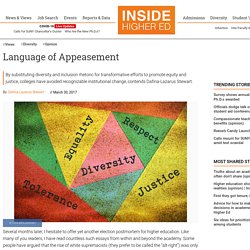
Like many of you readers, I have read countless such essays from within and beyond the academy. Some people have argued that the rise of white supremacists (they prefer to be called the “alt-right”) was only to be expected given the proliferation of identity politics in higher education. According those observers, by providing limited space and resources on campuses for the acknowledgment and celebration of various social identity groups that are underrepresented in colleges and universities, as well as marginalized across society, it was only a matter of time before white students would want to assert themselves as well.
Other commentators, such as Mikki Kendall recently, have noted higher education’s failure to educate its students about race and racism. That is where the politics of appeasement comes into play. Remembering Brutalism: the MySpace Literary Movement that Everyone Hated - VICE. List: 11 Ways That I, a White Man, Am Not Privileged - McSweeney’s Internet Tendency. 1.
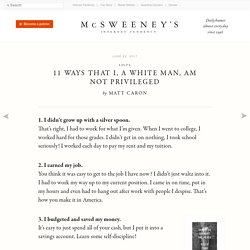
Tumblr's New Update Accidentally Blocked LGBT Content And People Are Pissed. Three Thoughts on Emotional Labour – GUTS. Recently a guy I went on a few dates with was going through a rough time.
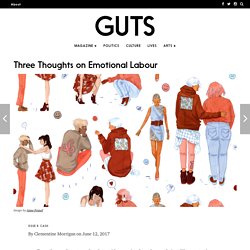
We were texting about it and I said “If there’s anything I can do to be supportive, please let me know.” He responded by asking me how he could accept support from me without exploiting my emotional labour. He pointed out that I, as a woman, am often expected to perform emotional labour, and that he, as a man, frequently benefits from the emotional labour of women. While he surely meant to demonstrate his knowledge of feminist issues his response annoyed me. It implicitly denied my agency in offering emotional support. Emotional labour is a skill set. Acknowledging the ways that emotional labour goes unseen and uncredited is important. Finding steady ground. Cognitive bias cheat sheet – Better Humans. You don’t have to. But you can start by remembering these four giant problems our brains have evolved to deal with over the last few million years (and maybe bookmark this page if you want to occasionally reference it for the exact bias you’re looking for): Information overload sucks, so we aggressively filter.
Noise becomes signal.Lack of meaning is confusing, so we fill in the gaps. Signal becomes a story.Need to act fast lest we lose our chance, so we jump to conclusions. Stories become decisions.This isn’t getting easier, so we try to remember the important bits. Syllabus for White People to Educate Themselves. So You Want to Wear a Safety Pin.
Great.
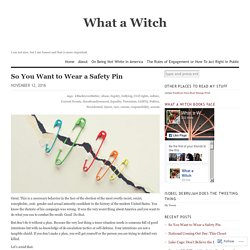
This is a necessary behavior in the face of the election of the most overtly racist, sexist, xenophobic, anti- gender and sexual minority candidate in the history of the modern United States. Politicizing Self-Care and Wellbeing in Our Activism as Women Human Rights Defenders. © We Are Here - courtesy Photoshare Politicizing Self-Care and Wellbeing in Our Activism as Women Human Rights Defenders | By Verónica Vidal and Susan Tolmay Stress, burn out, uncontrollable emotional outbursts, depression, anxiety, migraines and cancer, are some of the effects that human rights defense work has on WHRDs around the world, and the ones that often make them quit their important work.
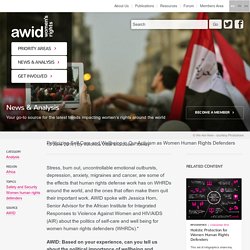
AWID spoke with Jessica Horn, Senior Advisor for the African Institute for Integrated Responses to Violence Against Women and HIV/AIDS (AIR) about the politics of self-care and well being for women human rights defenders (WHRDs) Boundary Setting vs Tone Policing - Brute Reason. Lately I’ve been disturbed by the tendency among many progressive folks to conflate boundary setting with tone policing. When I tell people that I have a very strong preference not to be yelled at or called names, they say, “But isn’t that kind of tone policing?” If it is, then I’ll have to admit to tone policing, because being able to set boundaries in my own space is important enough to me to risk pissing people off.
In fact, as anyone who sets boundaries with any regularity knows, it’s a surefire way to piss people off no matter what kind of boundaries they are. What empowerment is. Accomplices Not Allies: Abolishing the Ally Industrial Complex. Global Development Professionals Network. “Hi. I’m just calling because I’m looking for some more information about helping or aiding the local youths of North America. I really hear that obesity is a huge problem over there ... ” Saying 'Neckbeard' Isn't Hurtful in the Way You Think – Why We Need to Drop This Insult. The Problem with Callout Culture. 6 Signs Your Call-Out Isn't Actually About Accountability.